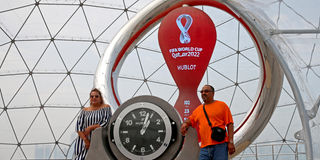Bankelele: Will Qatar be able to host 1.5 million visitors during World Cup?

People pose for a picture with the Qatar 2022 Fifa World Cup countdown clock in Doha on August 10, 2022.
With just over 50 days to the start of the 2022 World Cup, FIFA will this week launch a round of last-minute ticket sales that runs from 27 September till the end of the competition.
There's not been much news and excitement about ticket sales, unlike the previous global sports events where you have local travel agencies put together packages for local travelers. This is because the tickets are exclusively available on the FIFA website and through a few partners like Coca Cola which has awarded free trips and tickets to lucky fans to attend. There are four ticket classes, with one only for Qatar residents.
While FIFA states that the quarter-finals and finals are sold out, it is launching a new round of ticket offers for other rounds of the tournament. There's also no resale of tickets unless FIFA authorizes this and it enabled this on the platform for two weeks in August.
Qatar Airways, which is also a FIFA partner, has been flying to Nairobi since 2005 and has some world cup travel packages. You pick your favourite team and it puts together a flight, hotel and match trip package for you such as seven nights for three matches or 14 nights for four matches. The packages range from about $4,000 to $7,000 with the former being for accommodation in Fan Village cabins and the latter for one of the authorized hotels. Extra accommodation will also be on two large cruise ships that will be berthed in Qatar for the month of the World Cup, each with over 1,000 rooms.
The premium on accommodation is likely to determine the number of attendees at matches and a few days ago, the Qatar Ministry of Interior announced a ban on new visas. In effect, it was closing the country from October to December to all visitors as the county only wishes to handle visitors for the World Cup. The rule exempts its citizens and holders of work permits and some pre-approved humanitarian cases.
It is a reflection of a country that may not have the infrastructure to support the 1.5 million visitors expected for the World Cup. The tournament is being staged at 8 stadiums that are, at most, 75 kilometers between the furthest points.
Between November 1 and December 23, only foreign nationals with “Hayya” cards will be allowed in. Hayya, is a special digital card issued to people who have booked World Cup tickets and confirmed their accommodation arrangements in the country. You apply online, download the app, and enter your passport details and Hayya will be required to enter the country and the stadium venues. Visitors are asked to have their phones charged, with blue-tooth enabled, to generate their match tickets and confirm seat allocations at the stadium.
Qatar is drawing from experiences gained hosting the Club World Cup and IAAF athletics events in 2019 and also from public health measures developed for large sporting events when it successfully hosted the 2021 FIFA Arab Cup. A few years ago, I wrote about the challenges of staging the World Cup in the heat of Qatar. One of the mitigations was to have the traditional summer event in the winter months, the coolest time of the year in the Northern hemisphere.
Kenyan soccer ace Denis Oliech played in Qatar before he went to France. In one interview he said that the heat was very tough to play in. Africa is represented by five Nations: Senegal, Morocco, Cameroon, Ghana and Tunisia. Maybe, with their playing experience in such conditions, this is the time for one, perhaps a North African country, to clinch the trophy.





